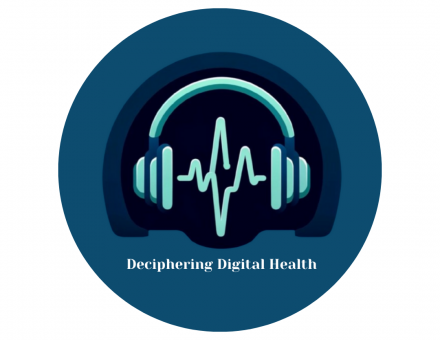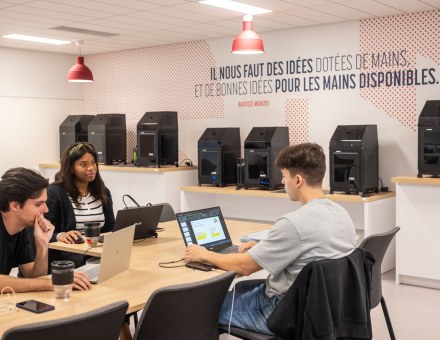Over January to April of the 2023-24 academic year, MSc in Health Management & Data Intelligence (HMDI) students were tasked with producing a four-episode podcast examining the complexities of digital health as part of the HMDI Go course. Two members of the student team and Program Director Professor Shaily Malik share their thoughts on the objectives, challenges and key takeaways of this insightful new addition to the MSc curriculum.
Editor’s note: This program is evolving into the MSc in Healthcare Innovation & Data Science for the 2025 intake.

Led by Professor Shaily Malik and Professor Alexandra Vallet (Program Director for the MSc in Health Management & Data Intelligence at École des Mines Saint-Étienne) and benefitting from guidance by industry experts, the students developed their podcasts with a view to blending entertainment and information of relevance to today’s digital era. Their work was structured into six distinct steps: Concept development, Research and Topic selection, Interview preparation, Recording sessions, Postprocessing and Editing, and Podcast release. For Professor Malik, the overarching aim of the initiative was clear: “we view Deciphering Digital Health as a go-to podcast for exploring the dynamic world where technology intersects with healthcare. By covering topics like AI implementation, data privacy, patient care, and the integration of AI into humanitarian work, our students have successfully identified and investigated the cutting-edge innovations that will shape future healthcare, whilst displaying considerable powers of innovation of their own”.
With roles within each student team distributed to cover the key tasks of topic researcher, interviewer, editor, and podcast marketer, the project enabled all participants to hone their critical thinking and analytical abilities whilst learning vital teamwork, collaboration, and communication skills along the way. For Pavan Kailash, the part he had to play was clearly defined: “as an editor, my job was to set the structure for the podcast, how we'd approach it, and format for questioning. I worked closely with the scriptwriter and the host, discussing details on the positioning of topics, and the general flow of the podcast.”.
On many occasions, this responsibility included paring down the initial content produced and selecting the most salient topics, so vast was the area discovered by the students. For Pavan, the composition of the team was a major plus: “the benefits of having a diverse team with various backgrounds helped the team stay grounded and consider the subject from human, administrative and regulatory perspectives.”.
A four-part deep dive with innovative healthcare organisations

The final segmentation of the content produced and prepped by the students resulted in four in-depth episodes dedicated to Humanitarian Health Tech, Digital Twins, The Future of Healthcare with AI, and The Balance between Humans and AI in Health. Featuring across the episodes were such luminaries as the Director of ACAPS (a non-profit, non-governmental project providing international, independent humanitarian analysis), the CEO of Predisurge (a French company dedicated to crafting software solutions for cardiovascular interventions), the CEO of Althenas (a prominent consulting software development company specializing in AI support for the health and biomedical sectors), and the Project Leader at DELPHI (a part of the NExT campus initiative at Nantes University).
For student Topic Researcher Meng-Chieh Lee, the project was a significant eye-opener, it being the first time creating such a medium: “I had never been involved in a podcast project, so I approached this opportunity with a strong desire to learn. My goal was to understand how a successful podcast is developed from start to finish. I gained insight into how a successful podcast is created—from topic selection and scriptwriting to the interaction between the interviewer and interviewee, and finally, how effective marketing strategies can ensure that our project reaches a broader audience.”
Casting students as creators of the healthcare sector
Among the various pedagogical objectives of the project was the development of practically applicable insights and observing future trends by producing top-notch podcasts ready for release to a potentially global audience. As Professor Malik states, “we intentionally cast the students as creators in the process, aiming to develop their knowledge of the field from the very start. This began with the research and topic development phase, where they were encouraged to explore and define areas of interest deeply and thoughtfully. By taking ownership of this initial stage, students not only gained a solid understanding of the subject matter but also laid the groundwork for a meaningful and impactful final product. Along with this, we urged them to communicate effectively, mastering the essential skills of interviewing, editing, and production. This comprehensive approach ensured that the end result was of genuine added value while also making the learning process an enriching and transformative experience.”.
A glimpse into the future of healthcare
On a broader level, the podcast project has also given all participating students a highly revealing glimpse into the future of the healthcare industry and the technological challenges and opportunities that wait, as Pavan underlines: “AI is already taking centre stage in every industry, not only Healthcare. However, the stakes for AI in Healthcare are much higher than any other industry because it involves people’s lives. We have to keep a close eye on the regulations and laws that govern AI, ensure that it is deployed in a way that enhances patient-doctor interactions, decreases errors, and improves the experience of all stakeholders in the ecosystem. It will be a challenging next decade for us but certainly one of the most defining ones for humanity.”.
The Deciphering Digital Health podcast will launch its second season mid-2025 and will feature the current MSc Health Management and Data Intelligence cohort exploring 4-6 captivating topics at the intersection of healthcare and technology. Building on last year’s success, students will once again engage with field experts, making the process both educational and inspiring.
In 2025, the MSc in Health Management & Data Intelligence will become the MSc in Healthcare Innovation & Data Science, a two-year program designed to train the next generation of healthcare consultants and business developers.


